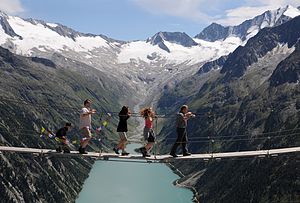 A simple suspension footbridge in the Zillertal Alps | |
| Descendant | |
|---|---|
| Carries | Pedestrians, livestock |
| Span range | short to medium |
| Material | Rope (fiber), chain, steel wire rope; appropriate decking material |
| Movable | No |
| Design effort | low |
| Falsework required | No |
A simple suspension bridge (also rope bridge, swing bridge (in New Zealand), suspended bridge, hanging bridge and catenary bridge) is a primitive type of bridge in which the deck of the bridge lies on two parallel load-bearing cables that are anchored at either end. They have no towers or piers. The cables follow a shallow downward catenary arc which moves in response to dynamic loads on the bridge deck.
The arc of the deck and its large movement under load make such bridges unsuitable for vehicular traffic. Simple suspension bridges are restricted in their use to foot traffic. For safety, they are built with stout handrail cables, supported on short piers at each end, and running parallel to the load-bearing cables. Sometime these may be the primary load-bearing element, with the deck suspended below. Simple suspension bridges are considered the most efficient and sustainable design in rural regions, especially for river crossings that lie in non-floodplain topography such as gorges.